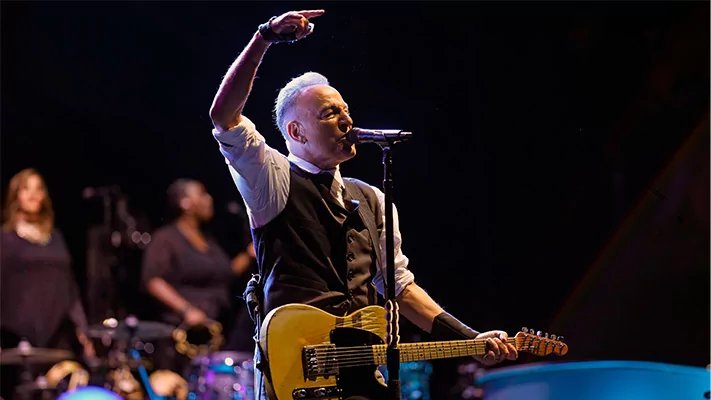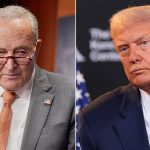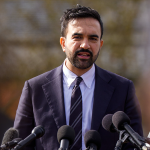Every big campaign event playing out across the United States this election season has its essential ingredients. There’s the chanting crowd, the patriotic festoonery, the smiling candidate, the platitude-stuffed stump speech, and the stirring popular song to start the party.
The process of how those songs are chosen, what effect they have, and how they’re acquired can be as complicated as the campaigns they serve, all while experts examine whether music’s application makes a difference in the grand scheme of Nov. 5.
Spotify lists logged more than 40 songs used by the presidential campaign of the Democratic nominee, Vice President Kamala Harris, this election season. Artists range from Prince to Beyoncé to Bob Marley. The campaign of former President Donald Trump, the Republican nominee, claims 55 songs from similar lists featuring the Rolling Stones, Elton John, and Guns N’ Roses.

Still, the Trump campaign must deal with the collection of largely left-leaning artists who openly oppose his use of their music, including Adele, Neil Young, Eddy Grant, Celine Dion, Phil Collins, and Bruce Springsteen — for his popular protest song, “Born in the USA” — plus the estate of the late rocker Tom Petty. Each artist or their inheritors objected to the use of a song and worried that Trump playing their work might signal an endorsement of the former president.
According to Alexandra Roberts, an attorney and law professor at Northeastern University, those artists can protest, but they might be unable to stop the Trump campaign from dropping the needle.
“Very often, the artist who wrote the song, performed the song, or is most closely identified with the song is not the copyright owner,” Roberts said. “For an event, the use of music is usually down to the venue, and it will usually have a license from the performing rights organization, such as ASCAP, that covers the composition. Having that license means the event and the venue are compliant with copyright law. There’s no law requiring payment separate from that.”
Los Angeles-based entertainment attorney Dinah Perez agrees with Roberts’s assessment, adding that the artist may be unable to prevent Harris or Trump from using their music if the label and/or publisher allows it.
“But there are ways for artists to request in the licensing of a song that it not be used for political purposes,” Perez added. “When Trump uses ‘Born in the USA,’ Bruce Springsteen is going to get upset because he doesn’t want people at that rally thinking he’s on board with Trump.”
After Taylor Swift snubbed Trump to endorse Harris, Perez wondered if the former president might choose a given rally song specifically to poke the bear and anger artists on the progressive end of the political spectrum — stirring up media attention while knowing that a singer or songwriter will do little more than complain.
“Often, the artist in question probably doesn’t really want to go through the trouble of suing a politician,” she said.
Amid all this fuss, John Street, emeritus professor at the University of East Anglia School of Politics, Philosophy, and Area Studies, insists songs rarely play a significant role in any election.
“Songs can crystallize and articulate causes and protests, which is important, but it would be hard to claim that they caused change,” Street said, citing Reagan’s 1984 crushing reelection victory over Democratic rival Walter Mondale.
“Reagan and Mondale both claimed ‘Born in the USA’ for their cause, but it is very unlikely that it contributed significantly to any outcome,” Street added. “In the U.K., the song ‘Things Can Only Get Better’ captured a mood that New Labour represented. It distilled a sentiment, but didn’t determine a result.”
As for Swift’s endorsement of Harris, Street sees some evidence that celebrity endorsements affect voter behavior to a small extent.
“My sense is that this impact is marginal, compared to all the other factors affecting voting,” he explained. “Taylor Swift is clearly a megastar with very devoted followers, and she can influence them to download her songs in billions and go to her shows. But, to vote one way or the other? I’m not so sure.”
Mark Clague is a professor of music at the University of Michigan and the author of the book O Say Can You Hear?: A Cultural Biography of “The Star-Spangled Banner.” Rather than using songs to persuade undecided voters, Clague believes campaigns choose their music to build a sense of community among supporters.
“Songs are a way to activate a sense of bonding amongst a party’s base,” Clague said. “It’s not unlike the use of music in a religious ceremony, repeated through ritual to create a sense of belonging.”
Clague disagrees with Street’s doubt that any campaign song choice or controversy can turn up the volume on a presidential race, considering how evenly divided the partisan audience is in 2024.
“The election is so close that a small number of votes and the emotional reaction of voters can make a big difference,” he explained. “Music is connected not to policy but to passion, fandom, celebrity, and family. Since many voters don’t feel they can trust the news media or any facts, they turn to their family and their tribe. The right music creates and motivates that tribe.”
Finally, when studying the complex interplay of music and political events, Virginia Kuhn, a professor of Cinema at USC and the director of the Institute for Multimedia Literacy in the Division of Media Arts + Practice, focuses on the strange interplay of campaigns and the ever-present wild card that is “Born in the USA.”
Often used as a patriotic anthem by Republicans and Democrats alike, even a cursory listen to The Boss’s tune reveals it’s a eulogy for the American dream and an exploration of economic hardships experienced by returning Vietnam War veterans. Regardless, countless campaigners storm out before an audience to its thumping rhythms and repeated chorus as though it celebrates Paul Revere, the Gettysburg Address, and D-Day.
CLICK HERE TO READ MORE FROM THE WASHINGTON EXAMINER
“It is quite ludicrous that the Springsteen song was so misunderstood,” Kuhn said. “It’s interesting to think about whether Springsteen could sue on the basis of market value, arguing that ‘liberals’ would turn away from the song because Trump used it. But Bruce’s public condemnation of the campaign was probably the best option.”
She added, “None of the campaigns are savvy enough, I don’t think, to even realize they’ve misused the song.”
John Lewinski, MFA, is a writer based in Milwaukee.























